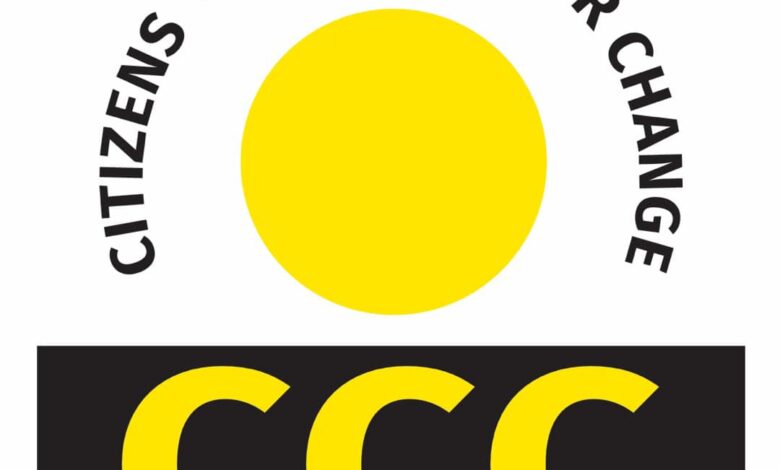CCC candidate selection process under scrutiny

The Citizens Coalition for Change (CCC) will be in the spotlight this week as it selects election candidates in a process the party says will include extensive background checks on their nominees, but observers call this recruitment a ‘black box’ with little public oversight.
The candidate selection process will take place this Wednesday across designated venues in the country and according to the party’s Bureau of Elections, the exercise will be presided over by a Citizen’s Candidates Independent Selection Panel (CISP).
CCC also said the Citizens National Assembly (CNA) shall initiate the selection process through a proclamation directed to the party, community stakeholders, and grassroots networks of Village Point Persons (VPPs) and Street Point Persons (SPPs).
However, some party members are dissatisfied because they claim the leadership has kept a tight lid on the selection process to prevent others from participating.
In a circular on the selection procedures, CCC said having conducted stakeholder and citizen candidate nomination surveys in wards or constituencies, the CISP will prepare a report that includes all names of nominated candidates, as well as scores and comments from stakeholders. During the nomination surveys, the scorecards of deployed citizens, incumbent councillors, and MPs who desire to run for office will be considered.
Nominated candidates will be approached by the CISP to ascertain their willingness for consideration as candidates.
“Candidates who accept the nominations shall be required to submit their CVs and other required documentation to the CISP for profiling and vetting. A candidate nominated for two or more vacancies shall be given the prerogative to select his or her preference,” said the party.
Candidates CV’s and other documentation will then be forwarded to the Candidate Vetting Committee (CVC) for profiling and vetting.
“The vetting shall be used to determine if candidates satisfy all relevant qualification requirements stipulated on the candidate selection regulations and the security risk of the candidates,” said the party.
Candidates who pass the security vetting shall be issued with Vetting Certificates and the CISP will publicly announce successful candidates.
“Nominated candidates would present their manifestos to eligible community members,” at caucuses convened by the party.
“Where circumstances do not permit, the CISP shall separate the stakeholder caucuses from the citizen caucuses,” said CCC.
“The CISP shall use a weighted average method to aggregate the evaluation scorecards including comments from the Community Stakeholder Focus Groups (CSFGs) and the Citizens Caucuses. The scorecards shall be used as the basis for establishing consensus amongst the candidates and producing one candidate.”
Where consensus fails, the CNA comes in or depending on complexity, grievances will be forwarded to the Candidate Grievance Handling Committee (CGHC) for adjudication and recommendation to the CNA.
“The CISP shall compile the final report with the list of successful candidates and submit to the CNA, which will adopt the report and announce names.”
Aggrieved party members told CITE, the imposition of candidates was likely because there would be no declaration of results on the day as the paperwork will be taken to Harare to vet people and then declare winners.
“There is a window to smuggle in more nominations for their preferred candidates to rig those who would have won. This looks still like a hidden attempt to still impose those they want. The rules keep changing daily to confuse people they don’t want,” said some insiders.
“Initially the selection was going to be ward based open nominations then now they are saying it will be street groupings. But people were not told of these changes openly. They are shared as if they are favours.”
The insiders claimed some members in Harare wanted interested candidates to pay them in exchange for accepting their nominations.
“Maybe that’s why they keep raising unnecessary changes to confuse others from planning with full information,” they alleged.
“This is a fake process. There is nothing genuine about communities choosing candidates because even the highest candidate can be dropped at the discretion for another who has fewer nominations or support.
CCC said authority for adjudication is reserved to the CNA, which shall make its final decision based on the CGHC’s recommendations, scorecards results and comments for the community focus groups or caucuses or any other ‘plausible consideration which it deems desirable.”
Other attributes relevant to the finalisation of the candidate list must be considered by the CNA.
The CNA has the power to disqualify candidates who violate the candidate selection regulations and also bar citizen members who violate the candidate selection laws or disrupt the candidate selection processes.
There shall also be a five-member Candidate Vetting Committee (CVC) appointed by the CNA at the national and district levels to scrutinise the council and parliamentary candidates while the CGHC shall be a five-member committee appointed by the CNA and chaired by a person with a reputable legal background.
“Any candidate or member aggrieved by the candidate selection proceedings omission or commission and decisions shall have the right of appeal to the CNA by completing the candidate selection grievance handling form.
The completed candidate selection grievance handling forms shall be forwarded to the CGHC committee within seven days after the completion of the process being complained of,” said CCC.
The CGHC shall have authority to call upon the aggrieved parties for a hearing or determine the matter and refer the same for confirmation by the CNA.
The CGHC shall present its findings and recommendations to the CNA for consideration
The adjudication of candidate selection grievances should be finalised within a period of not more than seven days after filing of the grievance.






